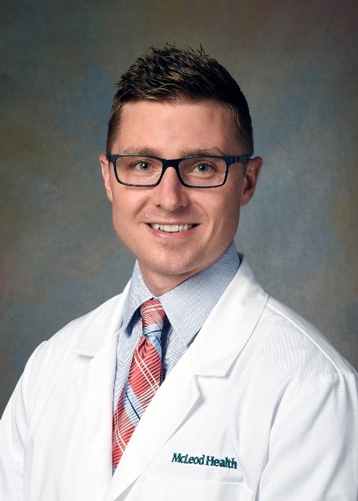Taking a Load off Your Shoulder

Rotator cuff repair surgery restores shoulder range of motion
By Dr. Zac DiPaolo
McLeod Orthopaedics
Inflammation or tearing of the rotator cuff is the most common shoulder injury in patients over the age of 40 years. Rotator cuff tears can develop over several years due to normal wear and tear, overuse, or they can occur suddenly as the result of a fall or other injury to the shoulder.
The rotator cuff is a group of four muscles that surround the shoulder joint. The rotator cuff muscles use tendons to attach to the humeral head, or ball, of the upper arm. The main function of the rotator cuff is to stabilize the shoulder joint in order to allow for normal and pain free shoulder range of motion. The rotator cuff muscles also contribute to shoulder strength and the ability to lift things over your head.
Overuse of the rotator cuff can cause pain and inflammation, and most commonly occurs in manual laborers, assembly line workers, or other jobs that require lots of heavy lifting, repetitive overhead movements, and strenuous work. Injuries to the rotator cuff typically occur after falls from height, high speed car accidents, or other significant trauma to the shoulder.
Pain, especially at night, is characteristic of a rotator cuff problem. Common symptoms of rotator cuff inflammation and tears include pain when trying to lift the arm, swelling, shoulder weakness and loss of function, and difficulty sleeping at night. Pain caused by the inflammation or tearing is typically felt on the side or front of the shoulder and may even radiate down the side of the upper arm.
Patients often report the inability to perform everyday tasks like dressing themselves or carrying groceries due to pain, weakness and limited mobility. Typically, shoulder pain and function will improve over the course of two to three weeks with some rest, oral anti-inflammatories and activity modification. However, pain and weakness that persist beyond two to three weeks, especially if it is interfering with normal activities and sleep, should be evaluated by a Sports Medicine Physician. Rotator cuff inflammation usually responds well to conservative treatments such as oral anti-inflammatories, steroid injections and physical therapy. Rotator cuff tears, however, tend to get larger and more painful over time leading to significant shoulder weakness and a decline in function. Therefore, surgical repair is often required for rotator cuff tears.
Rotator cuff repair is an outpatient procedure that is done arthroscopically, using a miniature camera, a light, and tools at the end of a flexible tube, through several small one-inch incisions around the shoulder. The goal of surgery is to reattach the torn rotator cuff tendon back to the bone. We do this by using multiple absorbable “anchors” and high strength sutures. This combination of anchors and sutures holds the rotator cuff in place while the body heals the tendon back down to the bone. This is a very strong connection and most patients do quite well after rotator cuff repair.
Rotator cuff repair surgery takes about one and a half to two hours and patients are able to go home the same day as surgery. Patients typically wear a shoulder sling for six weeks after surgery, and physical therapy begins in two to three weeks. Early on, physical therapy focuses on restoring shoulder range of motion while the rotator cuff heals. The healing process takes about three months. Once the tendon has healed appropriately and the shoulder has normal range of motion, strengthening can begin. It usually takes patients two to three months to regain their shoulder strength. Most patients are in physical therapy for a total of three to four months depending on the type of work and activities they are trying to return to. In general, people are able to return to their normal activities without restrictions five to six months after surgery.
An injured or painful shoulder that is not improving on its own may have a rotator cuff tear and should be evaluated by a Sports Medicine Physician. For more information about treatment options, call McLeod Orthopaedics at (843) 777-7900.
Dr. Zac DiPaolo is an orthopedic surgeon and sports medicine specialist with McLeod Orthopaedics. McLeod Orthopaedics is located at McLeod Medical Park Five at 1005 E. Cheves St., Florence, SC 29506.
-
McLEOD REGIONAL MEDICAL CENTER FLORENCE
843-777-2000 -
McLEOD DARLINGTON
843-777-1100 -
McLEOD DILLON
843-774-4111 -
McLEOD LORIS
843-716-7000 -
McLEOD SEACOAST
843-390-8100 -
McLEOD CHERAW
843-537-7881 -
McLEOD CLARENDON
803-433-3000



-
McLEOD REGIONAL MEDICAL CENTER FLORENCE
843-777-2000 -
McLEOD DARLINGTON
843-777-1100 -
McLEOD DILLON
843-774-4111 -
McLEOD LORIS
843-716-7000 -
McLEOD SEACOAST
843-390-8100 -
McLEOD CHERAW
843-537-7881 -
McLEOD CLARENDON
803-433-3000
 Find a Doctor
Find a Doctor  Locations
Locations  Services
Services